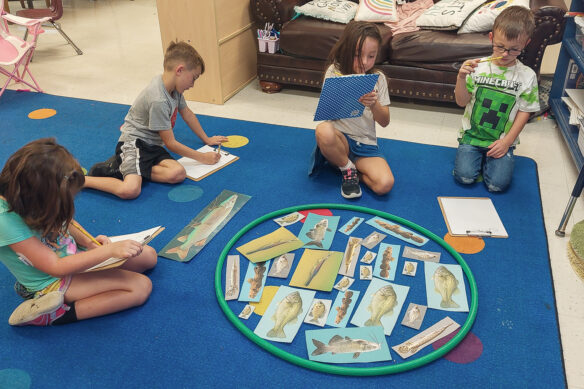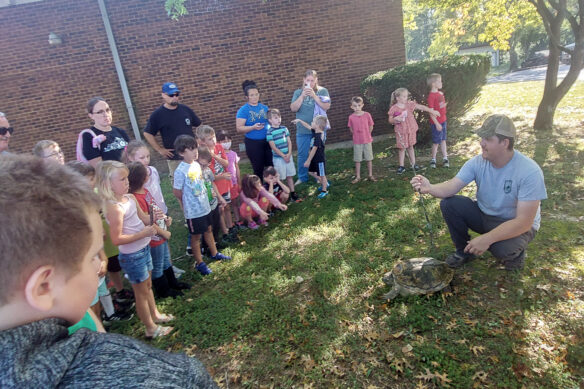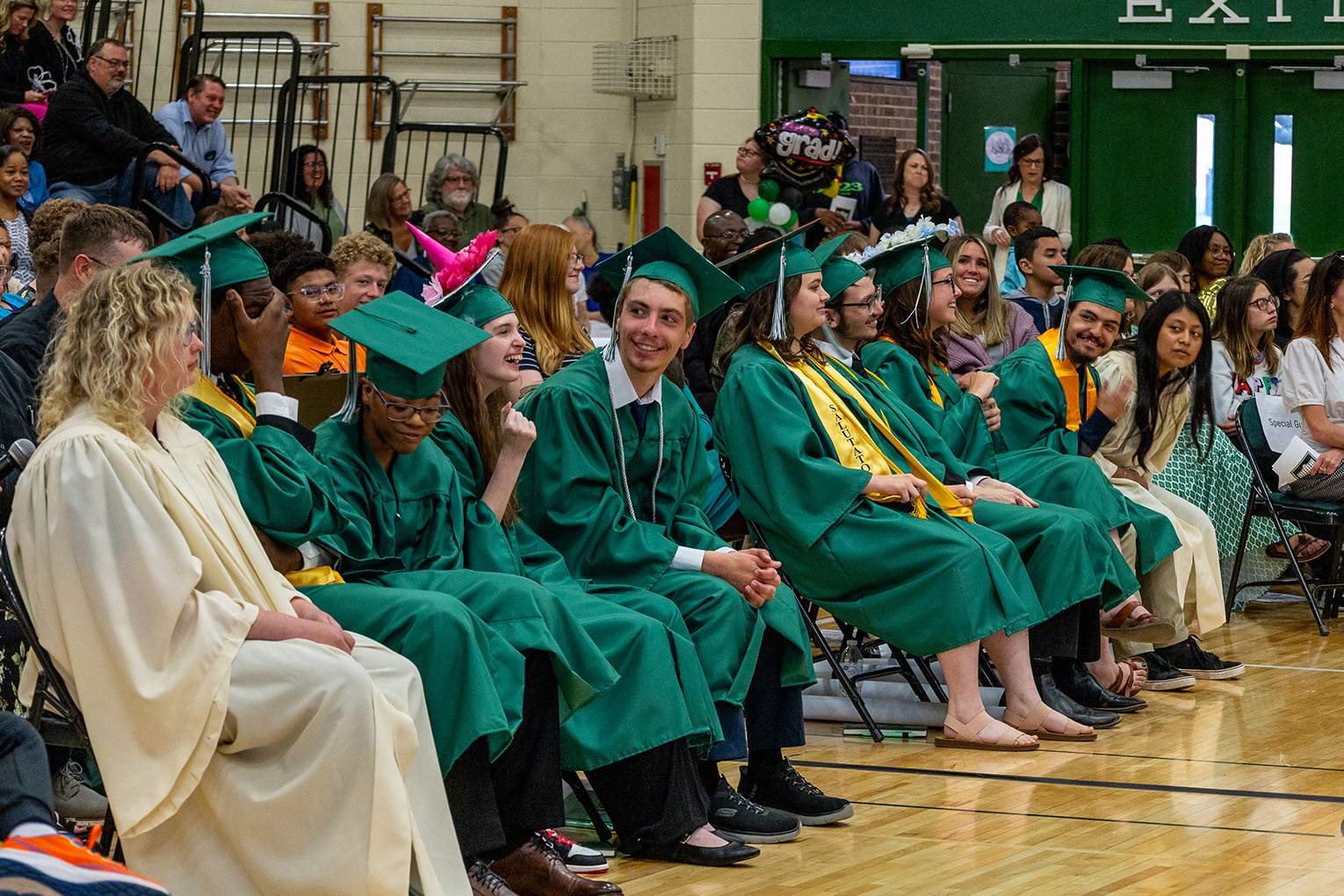
At Tilden Hogge Elementary School, 1st-grade students spent the first part of the school year exploring what it meant to be a citizen of Rowan County through a project-based learning experience that helped them inquire about their local wildlife, collaborate with community members and present their call-to-action to the public.
Photo submitted by Mollie Clark.
When sophomore Ava Blackledge started her chemistry class this school year, she didn’t know it would involve taking on the role of a local climate advocate. Project-based learning (PBL) changed her thinking about what her classes could be and what they could achieve.
“I do appreciate it when lessons connect to the real world as they solidify the abstract concepts we learn about,” she said. “I believe this is particularly important in science-related subjects as we are often learning about processes we cannot see. This real-world application definitely helps with my understanding of our topics.”
Thanks to $7 million in financial support from the Elementary and Secondary School Emergency Relief (ESSER) funding from the American Rescue Plan Act, the Kentucky Department of Education has a multi-year partnership with PBLWorks to scale high-quality PBL to one-third of Kentucky’s public schools by 2024.
Formerly known as the Buck Institute, PBLWorks is an organization dedicated to providing professional development in project-based learning to teachers and leaders at the school and district level. This is done through a blend of face-to-face workshops, personal online coaching, school site visits and deep collaboration via a peer network of trained on PBL Kentucky leaders.
PBLWorks defines project-based learning as a “teaching method in which students gain knowledge and skills by working for an extended period of time to investigate and respond to an authentic, engaging and complex question, problem or challenge.” All core content is linked to civic engagement and a community-oriented approach to the standards.
In eastern Kentucky, Rowan County Schools has implemented project-based learning across all grade levels. At Rowan County Senior High School, chemistry and general science teacher April Adkins led her students through a project-based learning experience about the scientific evidence surrounding ice caps melting. Through discussions with experts and research data analysis, Adkins allowed her students to showcase their learning through options including blog posts, podcasts or writing a letter to their legislators.
“I and a few others chose to write a letter about the dangers of polar ice melt and send it to our legislators. I believe that interacting with your governmental representatives is important and I was glad to have the opportunity to do so,” said Blackledge.
A few miles down the road at Tilden Hogge Elementary School, teacher Mollie Clark’s 1st-grade class learned about water conservation and the environment at Cave Run Lake, a place she said is culturally significant to the community and students in Rowan County.
“Our community is a very special place and Cave Run and fish and wildlife are a huge part of it,” she said. “They learned about so many things in this project from social studies, language arts, math and science standards.”
In the project, students explored their role as citizens of Rowan County and the characteristics of a good citizen. They investigated local wildlife and learned about the roles and responsibilities of those in the preservation field.
A large part of the project was connecting with local experts such as a fisheries biologist and former Rowan County educators. Making connections between schools and their community members also is one of the central themes of KDE’s United We Learn vision.
Tom Timmerman, a program coordinator for the Kentucky Department of Fish and Wildlife Resources, led the students on a field trip through the Morehead fish hatcheries. Timmerman said the department has had a long history of teaching children about nature and conservation, but this was especially special because his daughter attends Tilden Hogge.
“We are all parts of the community, educating kids is educating people in my community and telling them about the things I see every day and interact with every day,” he said. “With any topic of importance in our world whether it’s the environment or human rights, it’s important to spend just as much time educating the kids as adults. Catching them at an early age when they are impressionable is key.”

Zack Messer, a program coordinator for the Kentucky Department of Fish and Wildlife Resources, led 1st-grade students on a field trip through the Morehead fish hatcheries as part of their project-based learning assignment.
Photo submitted by Mollie Clark.
After the field trip, Clark invited the students to think of a way to support a call to action. Students worked with Rowan County High School students to create a public service announcement to share with the broader community on wildlife preservation in Morehead.
“The goal is to reach as many people in Rowan County, surrounding counties and visitors who might enjoy our lake community,” said Clark.
One of the core elements of gold-standard project based learning according to PBLWorks is making student’s work public. After the initial inquiry and community collaboration, students and teachers are encouraged to present their projects to the community to receive praise and feedback.
At Dunn Elementary School (Jefferson County), 4th-grade students spent the first part of the school year exploring native animals and plants in the Commonwealth. Assistant Principal Kim Slusher mentioned skill development among students as one of the biggest benefits of project-based learning.
“They’ve done their own research. They’ve incorporated writing articles into the unit,” she said. “Throughout this unit, they became those biologists.”
The experience engaged students in a meaningful way by providing them with agency in their education. The students selected their projects, what to research and how to show their learning.
Students Brody Thomas and Lincoln Weible focused on the Kentucky Blue Star plant for their project. According to the students, completing a project and engaging with content through their projects was enjoyable.
“I really liked it because we got to work on it whenever we wanted. It was hard and now it feels good that we’re finished,” said Weible.
Weible and his classmates presented their findings in the “Conservation in Action” exhibition Dunn Elementary hosted in November. The students used interactive exhibits to show their work to community members, including parents, teachers and fellow students.
“It enriches their learning experience because it provides them with a real audience outside of just their classmates. They have to provide that research and those critical thinking skills to show how their learning has happened over the last six-to-eight weeks,” Slusher said. “Then their audience can participate in their interactive presentation and learn from the knowledge that the kids are demonstrating.”
Fourth-grade teacher Sheri Rhodes said all skills gained during PBL will help students as they progress through elementary school and life.
“Students are solving a problem. It is real-world. What they’re doing through project-based learning is skills, collaboration, they’re using critical-thinking skills, deeper-learning skills, and those are all skills that they can take to the real world.”
Part of the success of project-based learning is getting all levels of educators involved in the process. PBLWorks offers three layers of leadership and implementation supports that research has shown leads to scale PBL across communities and sustain project-based learning. They offer:
- Teacher capacity building (PBL101 Workshops)
- School leader capacity building (School Leader Network)
- District leader capacity building (District Leader Network)
Jessica Williams, a 6th-grade social studies teacher at Elkhorn Middle School (Franklin County), said it’s the first year the school has done a school-wide push for project-based learning.
“Our 6th-grade team has really hammered in on it. We are all in on it,” Williams said.
Though easier to implement in enrichment courses, Williams said some teachers have really taken off and started using PBL in content classes. Williams and 10 other teachers signed up for the PBLWorks summer training for teachers and came back with a readiness to implement gold-standard project-based learning.
At the end of the school semester, Elkhorn hosted a community night where parents, students and other community members could visit classrooms to learn more about the projects.
Assistant Principal Crystal Hughes said the decision to go all in on project-based learning at Elkhorn Middle School was to give students opportunities to choose the way they learn and connect the projects to the community.
“It’s really taken us in a step toward more equitable learning,” she said.
MORE INFO…
KDE and PBLWorks partnership brings gold-standard project-based learning to state




Leave A Comment